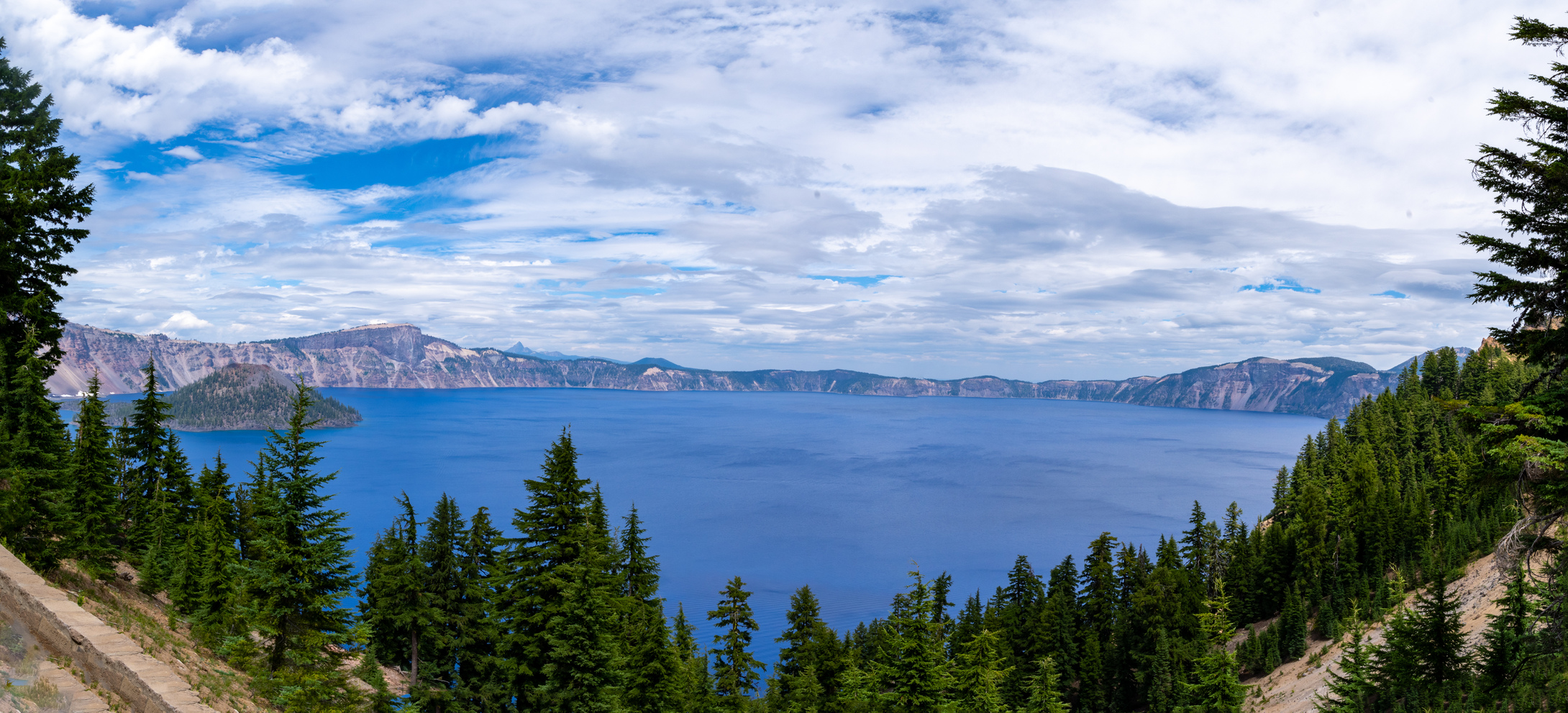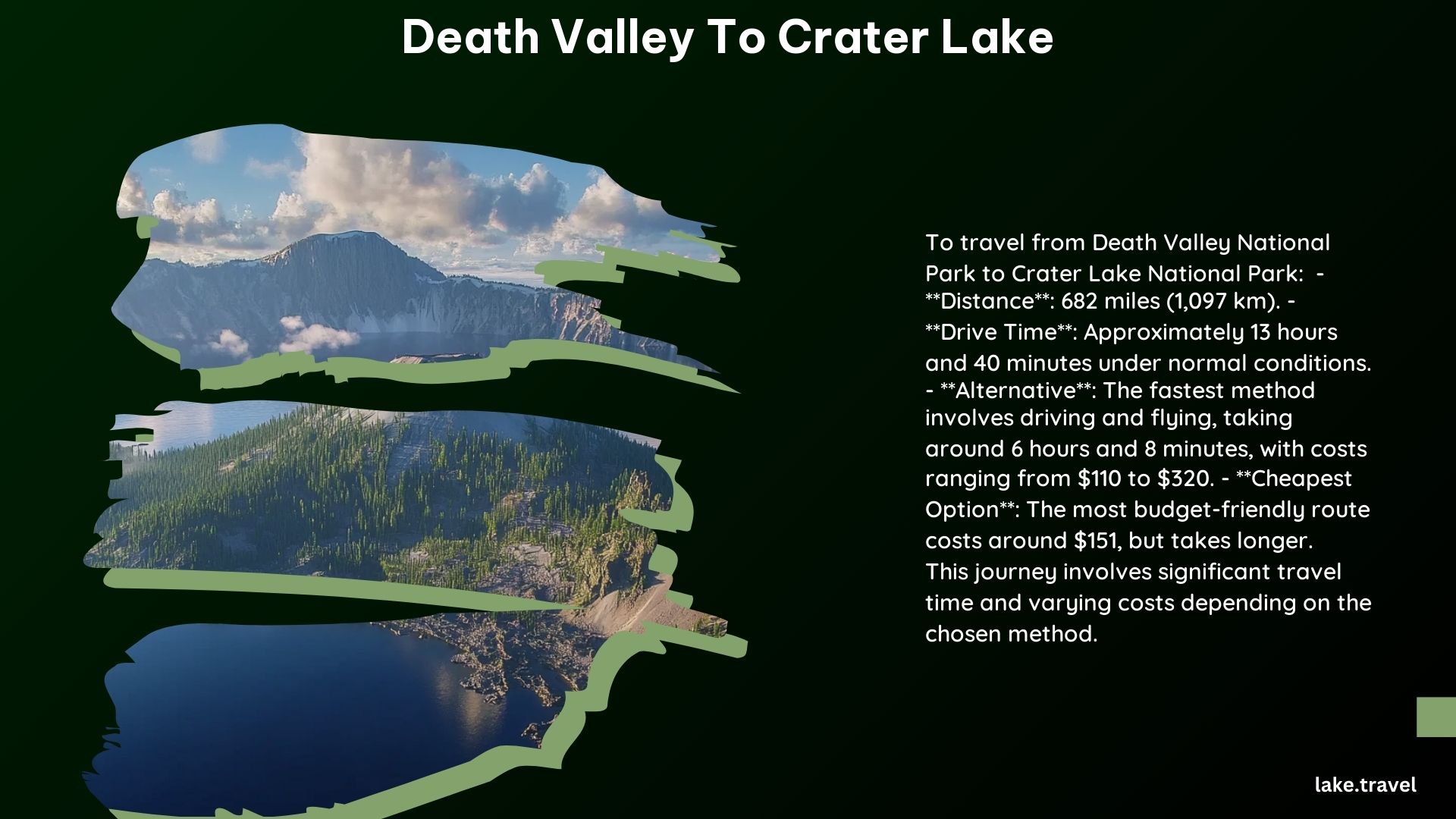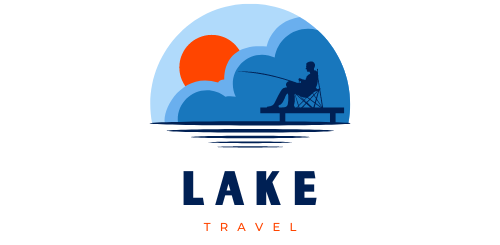The journey from Death Valley to Crater Lake spans approximately 656 miles, offering a diverse landscape of desert, mountains, and forests. This epic road trip takes about 11 hours of driving time, but it’s best enjoyed over several days to fully appreciate the scenic wonders and unique attractions along the way. From the scorching heat of Death Valley to the cool, crystal-clear waters of Crater Lake, this adventure promises unforgettable experiences and breathtaking vistas.
What is the Best Route from Death Valley to Crater Lake?

The most direct route from Death Valley to Crater Lake takes you through Nevada and California before entering Oregon. Here’s a breakdown of the journey:
- Start at Death Valley National Park, California
- Head north on US-95 through Nevada
- Continue on US-395 into California
- Take US-97 north into Oregon
- Arrive at Crater Lake National Park
This route offers a mix of desert landscapes, mountain ranges, and forested areas, providing a diverse and scenic drive.
How Long Does the Trip Take?

The driving time from Death Valley to Crater Lake is approximately 10 hours and 56 minutes without stops. However, it’s highly recommended to spread this journey over 2-3 days for several reasons:
- Safety: Avoid driver fatigue by breaking up the long drive
- Scenery: Take time to enjoy the diverse landscapes and attractions
- Exploration: Visit interesting towns and natural wonders along the way
A suggested itinerary might look like this:
| Day | Route | Estimated Driving Time |
|---|---|---|
| 1 | Death Valley to Tonopah, NV | 3 hours |
| 2 | Tonopah to Reno, NV | 4 hours |
| 3 | Reno to Crater Lake | 5 hours |
What Are the Must-See Stops Along the Way?
As you journey from Death Valley to Crater Lake, consider these captivating stops:
- Tonopah, Nevada: Known for its rich mining history and stargazing opportunities
- Reno, Nevada: “The Biggest Little City in the World” offers casinos, museums, and nearby Lake Tahoe
- Lassen Volcanic National Park: A detour worth taking for its unique volcanic landscapes
- Klamath Falls, Oregon: A charming town with natural beauty and outdoor activities
- Crater Lake National Park: The crown jewel of your trip, featuring the deepest lake in the United States
Each of these stops offers unique experiences and a chance to break up your journey with interesting sights and activities.
How Should I Prepare for the Drive?
Preparing for a road trip from Death Valley to Crater Lake requires careful planning. Here are some essential tips:
- Vehicle Maintenance:
- Check your car’s fluids, tires, and brakes before departure
-
Consider a tune-up if you’re due for one
-
Packing Essentials:
- Plenty of water (especially for the Death Valley portion)
- Snacks and non-perishable food
- First aid kit
- Blankets and extra clothing (temperatures can vary greatly)
-
Maps or GPS device (cell service may be spotty in remote areas)
-
Weather Considerations:
- Check forecasts for each leg of your journey
-
Be prepared for extreme heat in Death Valley and potential snow at higher elevations
-
Fuel Planning:
- Fill up before leaving major towns
- Don’t let your tank drop below half-full in remote areas
What Are the Best Times to Visit Death Valley and Crater Lake?
The best times to visit these two contrasting destinations depend on your preferences and tolerance for extreme weather:
Death Valley:
- October to April: Most comfortable temperatures, ideal for hiking and outdoor activities
- Summer months: Extremely hot, but can be interesting for experiencing record-breaking temperatures
Crater Lake:
- July to September: Warm weather, all park facilities open
- Winter months: Beautiful snow-covered landscapes, but limited access and activities
For the road trip itself, late spring or early fall can offer a good balance of weather conditions across the entire route.
What Unique Experiences Can I Expect at Each Destination?
Death Valley National Park:
- Badwater Basin: Walk on the lowest point in North America
- Zabriskie Point: Witness stunning sunrise or sunset views
- Mesquite Flat Sand Dunes: Experience desert landscapes at their finest
- Artist’s Drive: Take a scenic drive through colorful rock formations
Crater Lake National Park:
- Rim Drive: A 33-mile scenic route with 30 stunning viewpoints
- Boat Tour: Take a narrated tour of the lake (summer only)
- Wizard Island: Hike on this volcanic cinder cone within the lake
- Stargazing: Experience some of the darkest night skies in the country
How Can I Make the Most of My Visit to Crater Lake?
To fully appreciate Crater Lake National Park, consider these tips:
- Plan for at least a full day: The park deserves more than just a quick stop
- Take the Rim Drive: This scenic route offers the best views of the lake
- Hike a trail: Options range from easy walks to challenging climbs
- Visit Rim Village: Learn about the lake’s formation at the visitor center
- Stay overnight: Camping or lodging in the park allows for sunrise and sunset views
What Should I Know About Park Fees and Regulations?
Both Death Valley and Crater Lake National Parks require entrance fees:
- Death Valley: $30 per vehicle for a 7-day pass
- Crater Lake: $35 per vehicle for a 7-day pass
Consider purchasing an America the Beautiful Annual Pass for $80 if you plan to visit multiple national parks within a year.
Remember to follow park regulations:
– Stay on designated trails
– Practice Leave No Trace principles
– Observe wildlife from a safe distance
– Follow fire restrictions and camping regulations
How Can I Ensure a Safe and Enjoyable Trip?
To ensure a safe and enjoyable road trip from Death Valley to Crater Lake:
- Plan your route in advance: Know where you’ll stop for fuel, food, and rest
- Stay hydrated: Especially important in Death Valley’s extreme heat
- Check road conditions: Particularly important in winter months
- Inform someone of your plans: Share your itinerary with a friend or family member
- Carry a physical map: Don’t rely solely on GPS or cell phone service
- Be wildlife aware: Both parks have diverse wildlife; keep a safe distance and never feed animals
- Respect the environment: Follow park guidelines to preserve these natural wonders for future generations
By following these tips and taking the time to plan your journey, your road trip from Death Valley to Crater Lake will be an unforgettable adventure filled with diverse landscapes, unique experiences, and lasting memories.
